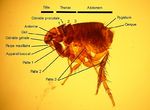Difference between revisions of "Ctenocephalides felis"
Jump to navigation
Jump to search
| Line 1: | Line 1: | ||
[[Image:Cat flea.jpg|thumb|right|150px|Cat Flea - Andy Brookes BS - Wikimedia Commons]] | [[Image:Cat flea.jpg|thumb|right|150px|Cat Flea - Andy Brookes BS - Wikimedia Commons]] | ||
| − | ''Ctenocephalides felis'' is the most commonly seen flea on both cats and dogs, it is also an important intermediate host in the parasite [[Dipylidium|Dipylidium caninum]] | + | ''Ctenocephalides felis'' is the most commonly seen flea on both cats and dogs, it is also an important intermediate host in the parasite [[Dipylidium|Dipylidium caninum]]. |
| + | |||
| + | ==Hosts== | ||
| + | Cats, dogs, and humans. | ||
*Most important flea in veterinary medicine | *Most important flea in veterinary medicine | ||
Revision as of 11:26, 19 July 2010
Ctenocephalides felis is the most commonly seen flea on both cats and dogs, it is also an important intermediate host in the parasite Dipylidium caninum.
Hosts
Cats, dogs, and humans.
- Most important flea in veterinary medicine
- Commonly called the 'cat flea'
- Can bite humans and other animals
- Both genal and pronotal commbs present
- Similar length genal combs
- The first genal spine is 0.75 times the length of the second
- Sloping nose
- 6 notches bearing setae on the dorsal border of the hind tibia
